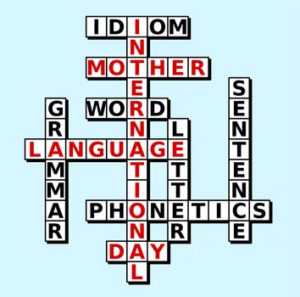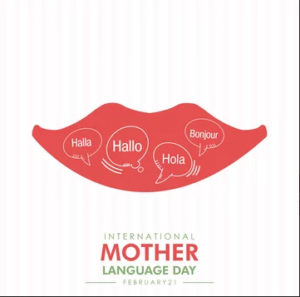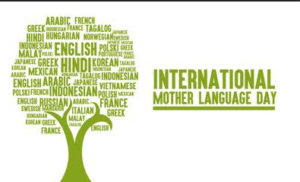Dr Ratan Bhattacharjee
 Multilingualism and diversity has always been encouraged especially during the International Year of Languages in the earlier years with the goal of promoting unity in diversity and global understanding. The technical support for the fundamental development of the mother language of the diverse people of the world is now a sine qua non for all projects related to language teaching. The theme of the day in 2021 was “Fostering multilingualism for inclusion in education and society” but with the restrictions of the pandemic, the program brief was curtailed in many countries. For this year, the theme is “Using technology for multilingual learning: Challenges and opportunities” which is expected to focus the potential role of technology to advance multilingual education and support the development of quality teaching and learning for all.
Multilingualism and diversity has always been encouraged especially during the International Year of Languages in the earlier years with the goal of promoting unity in diversity and global understanding. The technical support for the fundamental development of the mother language of the diverse people of the world is now a sine qua non for all projects related to language teaching. The theme of the day in 2021 was “Fostering multilingualism for inclusion in education and society” but with the restrictions of the pandemic, the program brief was curtailed in many countries. For this year, the theme is “Using technology for multilingual learning: Challenges and opportunities” which is expected to focus the potential role of technology to advance multilingual education and support the development of quality teaching and learning for all.

 Although it has been a United Nations (UN) initiative since 2002, the original idea to mark the day came from Bangladeshi migrants living in Canada who successfully petitioned the then UN Secretary-General Kofi Annan, to take action to save ethnic languages from extinction. The efforts of the Bangladeshi people to protect their language were honoured by UNESCO, which then established February 21st as International Mother Language Day in 2000.
Although it has been a United Nations (UN) initiative since 2002, the original idea to mark the day came from Bangladeshi migrants living in Canada who successfully petitioned the then UN Secretary-General Kofi Annan, to take action to save ethnic languages from extinction. The efforts of the Bangladeshi people to protect their language were honoured by UNESCO, which then established February 21st as International Mother Language Day in 2000.
 According to the UN, approximately 6,000 languages spoken across the world are at risk of extinction with a language disappearing every fortnight. While promoting intercultural dialogue and respect, languages have proven to also play important roles in the sustainable development of communities and the preservation of cultural heritage. On Mother Language Day, we may take a pledge to focus on the preservation and development of the regional
According to the UN, approximately 6,000 languages spoken across the world are at risk of extinction with a language disappearing every fortnight. While promoting intercultural dialogue and respect, languages have proven to also play important roles in the sustainable development of communities and the preservation of cultural heritage. On Mother Language Day, we may take a pledge to focus on the preservation and development of the regional  languages and dialects. Language is the blood of the soul through which thoughts run and out of which they grow. English, for the Indians cannot exude that magic that one’s mother tongue can in spite of all the lures that the foreign language carries. We think in our mother tongue which Tagore once called ‘mother’s milk.’ Mother tongue is like mother’s milk. A robust nation thinks in mother tongue but in a country like India where there is diversity in linguistic culture, there must be an extra care taken to nourish them all independently.
languages and dialects. Language is the blood of the soul through which thoughts run and out of which they grow. English, for the Indians cannot exude that magic that one’s mother tongue can in spite of all the lures that the foreign language carries. We think in our mother tongue which Tagore once called ‘mother’s milk.’ Mother tongue is like mother’s milk. A robust nation thinks in mother tongue but in a country like India where there is diversity in linguistic culture, there must be an extra care taken to nourish them all independently.
Dr. Ratan Bhattacharjee is a Senior Professor of English and Head Post Graduate Dept Dum Dum Motijheel College is also a trilingual Poet and Columnist.



